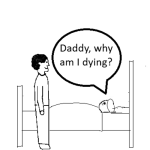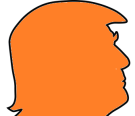
Orange You Glad Trump's Not A Forever President?
The Republican leaders are attempting to enact legislation that will hopelessly pollute our environment. If they succeed, it will be too late to go green. Why? Click on this cartoon and read the comic strip ------------->
You are Heather, watching the starving whales feebly try to sing and the thirsty bees search for flowers that are no longer there. You see your children turn their trusting eyes to you to ask why the air is so polluted it makes them cough.
You are Javier, watching the climate- changed air temperature spike to 100 degrees one day and plunge to 40 degrees the next. The water in the Gulf of Mexico, that's supposed to keep our climate from changing and getting stormier, can no longer do so.
Republican Senators and Representatives are trying to repeal the Environmental Protection Agency's (EPA’s) Endangerment Finding.
Will you make a 2-minute phone call to the EPA Administrator's office at…
202-564-4700
…and, united with thousands of others making the same call, keep the Environmental Protection Agency, the bees, the whales, and all of us alive?
The Republican leaders attempt to pollute our environment. Make the call.





